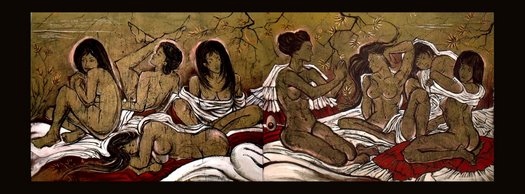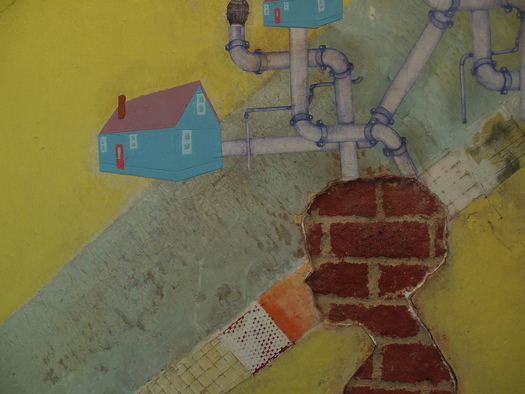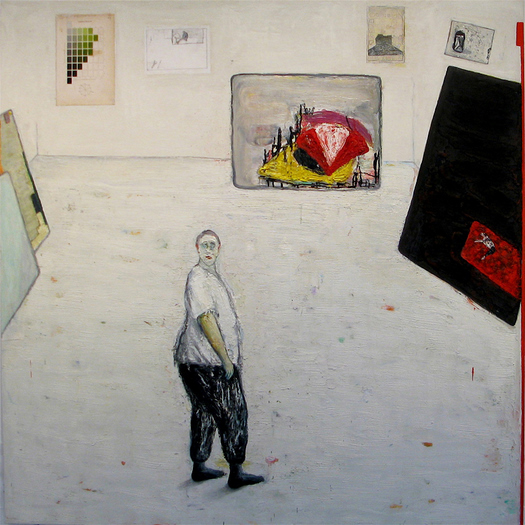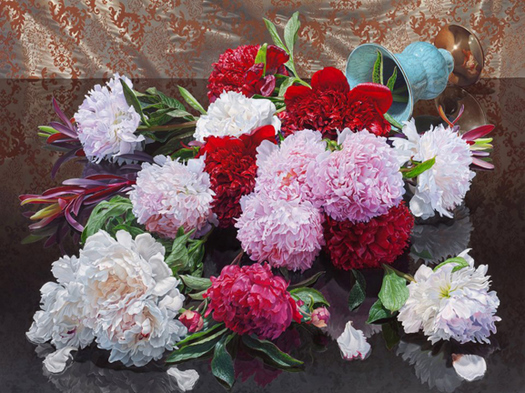My favorite statement about how artists use intuition comes from Pablo Picasso. I have looked everywhere to try and find the precise quote, and can't, but it went something like this...
Picasso told a friend that intuition was like having a carrier pigeon with a message land on your balcony. "The important thing is knowing that the pigeon has arrived," he said, "you don't have to unroll the message and read it."
Intuition is such a crucial, essential ingredient for artists. I recently asked a number of my art world Facebook friends about how the role it plays in their artistic process, and their replies were diverse and insightful. Below are some quotes that stood out. Following that are a few paintings linked to some commentaries that went into more depth.
Steve Macks Dilley (Ceramicist)
"I start with an idea (sometimes not) but it is the intuition that leads me. I know it is right and true when I can feel it in my "gut" (an acronym for 'grand unifying theory)."
Lisa Pressman (Painter)
"Intuition in my studio practice is crucial. It is about trusting and not thinking. The thinking part comes later..."
Sheryl Humphrey (Painter)
"For me, intuition is the DNA of an artwork -- its nature. Intellect then molds the work -- its nurture."
Julia Schwartz (Painter)
"I have written something like 'my only intention is to paint without intention' which means for me without conscious intention, i.e. because of course there are unconscious forces (intuition?) guiding the work."
Raegan Russell (Painter)
"There are always intentional forms, words and symbols which work themselves into a painting, but it is through an intuitive gut-felt impulse to paint out, scrape, and revise that the painting tells me what IT wants, rather than what I want it to be."
Kim Niles (Artist and Illustrator)
"To me, intuition is what I use to determine whether the mistake I just made is going to be a great 'happy accident' that takes the artwork into an entirely new direction, or if a fresh start is in order."
Chris Messner (Photographer)
"True inspiration unfolds itself, not by force or it becomes fake. True intuition is also the ability to be observant."
Eric M. Davis (Painter)
"Relying on my intuitive sense gives my work its natural and unique qualities, revealing the soul of my work. Through my choices others can see through their eyes what I have seen through my eyes."
Karen Kaapcke (Painter)
"I think we also all probably have tricks for getting at intuition - painting fast, painting tired, working first thing in the morning, getting into yoga, even drinking and other forms of mental disruption though of course those end up interfering..."
Catherine Ruane (Painter)
"Intuition for me is that gutsy crimp in my stomach that says....no that's not right or yeah, that works. It is sort of like the patron saint of art."
Kay Ruffini (Painter)
"Intuition is the essence of the whole creative process. If art isn't about feelings, then what is its purpose? Everything starts with intuition."
Sally Weiner Grotta (Painter)
"I don't 'use' intuition. It's simply is a path that I walk, the direction I go, pulled this way or that. The subconscious amalgam of inspirations, ideas, curiosity, vision and a hope that it will all string together once I apply sweat and know-how."
Cecily Herzig (Mixed-Media Artist)
"For me when painting, I'm most successful when I let all organized thought go; my eyes blur, and my pen goes. Whatever odd words pass through my mind I place on the page, where the edge of a paint stain looks like an eye or and arm or a mouth I let it become that, regardless of the logical nature of the form."
Leslie A. Brown (Painter)
"It is an overwhelming sense of knowing ,when you realize you are the vehicle and not the driver. You are just moving through it and it is moving through you. You become the 'is' or the 'am'. and it is perfect; as perfect as it ever gets to be in this form."
Gromyko Semper (Painter, Draftsman)

Gromyko Semper, "Daughters of Eve," 2011, diptych, acrylic, tempera and ink on canvas, 3' x 8'
"It all starts like magic...a sudden gush of inspiration, a hymn ,a whisper, an idea comes to mind, conscious of unconscious...phantoms or spirits or whatever other names they are called...premonitions and visions...automatisms and paranoiac visages...sometimes they come to me when I'm reading, other times they go as empty vessels...then I begin to create..."
Lambert Fernando

Lambert Fernando, "ABC 2," 2011, 6' x 4' Mixed media
"It is widely said that the first five years of life are the most fundamentally important in terms of structuring the person you will develop into. I came to the United States from the Philippines when I was five years old. Even as a small child I absorbed the emotional charge and sense of place in an extremely visceral way in those years before I came to the States. The smells, the textures, the colors---these are all an integral part of my being as an artist, down to the quality of the wood floorboards and the faded patina of the wallpaper. What made a huge impression on me was the jarring contrast between my old memories of that early childhood and the glaring newness of suburban Long Island into which I was forcibly moved.
For me, color is intuitive. The color decisions I make when starting a painting dictate the atmosphere and feel of the entire piece. Memories of my former country come to me in quick fragments and colors, and this is when I usually begin a canvas---laying down sections of colors, layers, and materials. Creating a work of art is a bit of a literal and figurative digging into my elusive personal history. I will spend up to a year on one piece, carving, sanding away, and scratching into the paint and textures until I feel that it is finished.
The lexicon that I have developed over the years is also part of a very natural, flowing and intuitive process. The symbols are culled from a variety of sources; a few old photographs and video stills of myself as a child and long gone family members, maps, nature, and patterns and wallpaper bits that strike a chord with me subconsciously. A new recurring motif is the idea of the American suburban home, and I will photograph houses that I see driving around the country which represent my own vision of this idea. The houses then show up on canvases as falling or floating, or as small pieces in larger installation works.
Ultimately a finished piece for me is a hyper-real look into a moment of recognition of some lost bit of time in my personal history."
Brenda Goodman

Brenda Goodman, "Quandary," 2011, 72" x 72", Oil and collage on wood
Courtesy of the John Davis Gallery, Hudson, NY
"With some exceptions all my paintings start with a surface full of random marks and gestures until it is completely filled. I step back and look until certain shapes emerge that I resonate with. Those initial marks that are now shapes and colors start tumbling around the picture plane while intuitively I am seeing and feeling what my unconscious wants to say. Most of the time it connects to what I am dealing with in my life I can never explain intellectually why a painting of mine works. If it 'feels' right, then it's right and I know it on an intuitive level."
Eric Wert

Eric Wert, "Peonies," 2011, 36" x 48", Oil on canvas
Courtesy William Baczek Fine Arts, Northampton, MA.
"When I read or hear others speak about intuition, it's generally as a positive or exciting experience, but I have the opposite response. When starting a painting or choosing a subject, there's usually a point when I see something so complicated or challenging that the thought of painting it makes my stomach hurt. It's like a cold, sinking feeling of fear and panic; and it's not pleasant. Over the years, I've found that my most successful pieces have been the ones that begin with that feeling and where I struggle to overcome the anxiety.
Maybe that's a little personal - but intuition isn't always fun."
Picasso told a friend that intuition was like having a carrier pigeon with a message land on your balcony. "The important thing is knowing that the pigeon has arrived," he said, "you don't have to unroll the message and read it."
Intuition is such a crucial, essential ingredient for artists. I recently asked a number of my art world Facebook friends about how the role it plays in their artistic process, and their replies were diverse and insightful. Below are some quotes that stood out. Following that are a few paintings linked to some commentaries that went into more depth.
Steve Macks Dilley (Ceramicist)
"I start with an idea (sometimes not) but it is the intuition that leads me. I know it is right and true when I can feel it in my "gut" (an acronym for 'grand unifying theory)."
Lisa Pressman (Painter)
"Intuition in my studio practice is crucial. It is about trusting and not thinking. The thinking part comes later..."
Sheryl Humphrey (Painter)
"For me, intuition is the DNA of an artwork -- its nature. Intellect then molds the work -- its nurture."
Julia Schwartz (Painter)
"I have written something like 'my only intention is to paint without intention' which means for me without conscious intention, i.e. because of course there are unconscious forces (intuition?) guiding the work."
Raegan Russell (Painter)
"There are always intentional forms, words and symbols which work themselves into a painting, but it is through an intuitive gut-felt impulse to paint out, scrape, and revise that the painting tells me what IT wants, rather than what I want it to be."
Kim Niles (Artist and Illustrator)
"To me, intuition is what I use to determine whether the mistake I just made is going to be a great 'happy accident' that takes the artwork into an entirely new direction, or if a fresh start is in order."
Chris Messner (Photographer)
"True inspiration unfolds itself, not by force or it becomes fake. True intuition is also the ability to be observant."
Eric M. Davis (Painter)
"Relying on my intuitive sense gives my work its natural and unique qualities, revealing the soul of my work. Through my choices others can see through their eyes what I have seen through my eyes."
Karen Kaapcke (Painter)
"I think we also all probably have tricks for getting at intuition - painting fast, painting tired, working first thing in the morning, getting into yoga, even drinking and other forms of mental disruption though of course those end up interfering..."
Catherine Ruane (Painter)
"Intuition for me is that gutsy crimp in my stomach that says....no that's not right or yeah, that works. It is sort of like the patron saint of art."
Kay Ruffini (Painter)
"Intuition is the essence of the whole creative process. If art isn't about feelings, then what is its purpose? Everything starts with intuition."
Sally Weiner Grotta (Painter)
"I don't 'use' intuition. It's simply is a path that I walk, the direction I go, pulled this way or that. The subconscious amalgam of inspirations, ideas, curiosity, vision and a hope that it will all string together once I apply sweat and know-how."
Cecily Herzig (Mixed-Media Artist)
"For me when painting, I'm most successful when I let all organized thought go; my eyes blur, and my pen goes. Whatever odd words pass through my mind I place on the page, where the edge of a paint stain looks like an eye or and arm or a mouth I let it become that, regardless of the logical nature of the form."
Leslie A. Brown (Painter)
"It is an overwhelming sense of knowing ,when you realize you are the vehicle and not the driver. You are just moving through it and it is moving through you. You become the 'is' or the 'am'. and it is perfect; as perfect as it ever gets to be in this form."
Gromyko Semper (Painter, Draftsman)

"It all starts like magic...a sudden gush of inspiration, a hymn ,a whisper, an idea comes to mind, conscious of unconscious...phantoms or spirits or whatever other names they are called...premonitions and visions...automatisms and paranoiac visages...sometimes they come to me when I'm reading, other times they go as empty vessels...then I begin to create..."
Lambert Fernando

Lambert Fernando, "ABC 2," 2011, 6' x 4' Mixed media
"It is widely said that the first five years of life are the most fundamentally important in terms of structuring the person you will develop into. I came to the United States from the Philippines when I was five years old. Even as a small child I absorbed the emotional charge and sense of place in an extremely visceral way in those years before I came to the States. The smells, the textures, the colors---these are all an integral part of my being as an artist, down to the quality of the wood floorboards and the faded patina of the wallpaper. What made a huge impression on me was the jarring contrast between my old memories of that early childhood and the glaring newness of suburban Long Island into which I was forcibly moved.
For me, color is intuitive. The color decisions I make when starting a painting dictate the atmosphere and feel of the entire piece. Memories of my former country come to me in quick fragments and colors, and this is when I usually begin a canvas---laying down sections of colors, layers, and materials. Creating a work of art is a bit of a literal and figurative digging into my elusive personal history. I will spend up to a year on one piece, carving, sanding away, and scratching into the paint and textures until I feel that it is finished.
The lexicon that I have developed over the years is also part of a very natural, flowing and intuitive process. The symbols are culled from a variety of sources; a few old photographs and video stills of myself as a child and long gone family members, maps, nature, and patterns and wallpaper bits that strike a chord with me subconsciously. A new recurring motif is the idea of the American suburban home, and I will photograph houses that I see driving around the country which represent my own vision of this idea. The houses then show up on canvases as falling or floating, or as small pieces in larger installation works.
Ultimately a finished piece for me is a hyper-real look into a moment of recognition of some lost bit of time in my personal history."
Brenda Goodman

"With some exceptions all my paintings start with a surface full of random marks and gestures until it is completely filled. I step back and look until certain shapes emerge that I resonate with. Those initial marks that are now shapes and colors start tumbling around the picture plane while intuitively I am seeing and feeling what my unconscious wants to say. Most of the time it connects to what I am dealing with in my life I can never explain intellectually why a painting of mine works. If it 'feels' right, then it's right and I know it on an intuitive level."
Eric Wert

"When I read or hear others speak about intuition, it's generally as a positive or exciting experience, but I have the opposite response. When starting a painting or choosing a subject, there's usually a point when I see something so complicated or challenging that the thought of painting it makes my stomach hurt. It's like a cold, sinking feeling of fear and panic; and it's not pleasant. Over the years, I've found that my most successful pieces have been the ones that begin with that feeling and where I struggle to overcome the anxiety.
Maybe that's a little personal - but intuition isn't always fun."
